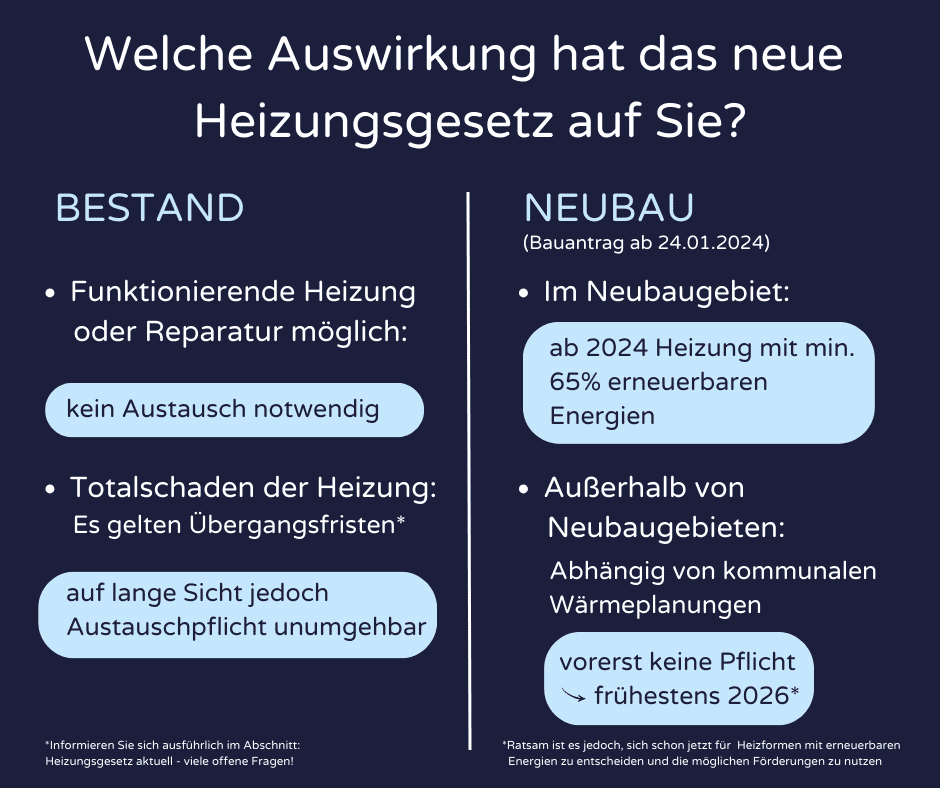German Buildings Energy Act GEG: “Heizungsgesetz” 2024

Energy transition, energy efficiency, climate protection, CO2 emissions, ecological footprint – the environment has traditionally been a high priority in public discourse in Germany. The Buildings Energy Act 2024 – also known colloquially as the Heating Act – has now put the environment and costs back on the agenda. The debate about “Robert Habeck’s heating law” is being vigorously pursued. It is true that properties and their energy efficiency play a significant role in consumption and greenhouse gas emissions. As part of the new Heating Act, this is set to change from the start of 2024, as energy-efficient refurbishment will be mandatory. What is the Heating Act about and what will property owners have to expect in 2024?
What does the new German Buildings Energy Act mean
After months of debate and an intense exchange of blows, the Bundestag passed a new German Buildings Energy Act on September 8, 2023, with a majority of the coalition of the traffic light coalition. Building Energy Act 2024 – GEG for short. Habeck’s heating law is due to come into force on 01.01.2024. But what does the heating law contain? Will heating systems have to be replaced?

Source: Own illustration
In a nutshell: from the beginning of next year, only new heating systems that are powered by at least 65% renewable energy are to be installed in Germany. The good news first – this does not (yet) apply to all heating systems and every landlord.
Who will have to install a new heating system from 2024? This primarily affects new builds in new development areas, i.e. not new builds in gaps between buildings elsewhere. The situation is clear for new builds in new-build areas: the heating system selected must be climate-friendly and meet the above conditions.
For existing heating systems, nothing changes for the time being as long as they work. So there is no immediate replacement obligation! The Heating Act therefore only really applies to new buildings for the time being. But how will this develop in the future?
Heating Act for existing buildings and outside new construction areas
The direction of further development for existing homes and new buildings in gaps between buildings depends on the comprehensive municipal heating plans. These are mandatory. According to the Heat Planning Act, large cities with more than 100,000 inhabitants must submit their heat plans by mid-2026. All others have until 2028. This is intended to inform citizens and businesses alike about which options for climate-neutral energy supply are already available locally and which will be available in the future.
This means that as long as there is no final municipal heating plan, there is a free choice of heating for old buildings, existing buildings or new buildings outside of new development areas.
Current heating law – many unanswered questions!
Property owners have many questions about the Heating Act 2024, for example:
Which heating system can I still install in 2023?
This question is easy to answer: any. However, this step needs to be carefully considered in order to avoid high follow-up costs. If a gas heating system is installed now, it should be possible to convert it. This means that from 2029 it must be able to be operated with increasing proportions of climate-neutral gas from hydrogen or biomass. There will be a definitive ban on heating systems using fossil fuels from 2045.
What if the gas heating breaks down after 2024?
Repairs may be carried out on current heating systems such as oil and gas heating systems. In the event of irreparable damage, a “heating breakdown”, transitional periods of several years come into force. During this period, a used heating system with fossil fuels can be used on a transitional basis. After 5 years, a climate-neutral alternative must be installed. If a connection to the heating network is already possible in the foreseeable future, then a 10-year transitional period applies. For gas heating systems, the conversion period is 13 years. This means that in the long term, if the heating system breaks down completely, it will have to be replaced to make it more climate-friendly. Only house and apartment owners for whom the conversion costs would exceed the value of the property can be exempted.
Which heating systems will still be permitted in 2024?
At least 65% of the heat source for newly installed heating systems in new-build areas must come from renewable energies. Which heating technologies are eligible for this?
- Connection to a district heating network (so far mainly found in large cities)
- Heating with a heat pump
- Hybrid heating (mixture of gas or oil and renewable technologies such as heat pumps or solar)
- Direct electricity heating (infrared heating, attractive with good insulation)
- Solar heating (exclusively solar thermal energy is only possible if the property is very well insulated, otherwise a combination with other types of heating is recommended
- Pellet or wood heating
- Only for existing buildings: gas heating systems that can be converted to 100% hydrogen
There is a wide choice, but consumers have little knowledge of heating. Which type of heating is the right one depends on various factors.
It is advisable to seek help from qualified energy consultants. Such advisors are listed on the website Energy Efficiency Experts, for example. The consumer advice centers offer a low-cost introductory consultation funded by the Federal Ministry for Economic Affairs and Climate Protection.
Heating Act: effects on real estate
Is the energy balance of a property a decisive valuation factor in the future
You should be prepared to invest in energy-efficient renovations and pay attention to this when buying a property in order to avoid follow-up costs. Habeck’s heating law will certainly also have an impact on property prices. A property that already meets the new standards will fetch a higher price than one that is yet to be retrofitted.What does the new heating law mean for landlords and tenants?
Sooner or later, landlords will be obliged to provide new heating systems based on renewable energies as conditions develop. In future, a maximum of 10% of the modernization costs can be passed on to tenants each year. However, this only applies if a state subsidy has been claimed and the subsidy amount is deducted from the apportionable costs. If the subsidy is waived, only 8% can be passed on annually.
What is the relationship between rental costs and heating law?
The energy-related renovation levy is capped at 50 cents per month and square meter. The situation is different for modernizations such as new windows or insulation. Here, up to 3 euros per square meter may be charged. There are hardship regulations for tenants on low incomes.
Meine-Renditeimmobilie develops properties itself and always ensures a positive energy performance certificate. The Building Energy Act is already an integral part of all properties developed by Meine-Renditeimmobilie. The properties are equipped in such a way that they meet the necessary requirements to function as an attractive and promising capital investment. If it is not technically possible to comply with the new law from the outset, the additional costs incurred in the future are factored in from the start.
New heating law funding
The Heating Act 2024 represents a high financial burden, but the changeover is significantly supported by funding programs. Regardless of the type of heating, there is a basic subsidy of 30% for everyone switching from an old, fossil-fuel heating system to one powered by renewable energy.
Anyone who voluntarily converts their heating system before the end of 2028 will also receive a speed bonus of 20%. For owner-occupied properties and an annual taxable income of less than 40,000 euros, there is also a 30% income-related bonus. A combination of several subsidy options is permitted, but the limit for the total subsidy is 70%.
Criticism of the heating law
Although the obvious purpose of the new Heating Act 2024 is clear, many question the usefulness of its implementation and its chances of success. Climate protection should be seen as a global responsibility. Can the Heating Act achieve the climate protection targets and at what cost? Prohibition policies and financial burdens primarily affect citizens. After all, state subsidies are also ultimately borne by the taxpayer. Hence the disagreements between the individual coalition members when it came to the draft bill in question. How exactly everything will develop over the next few years is written in the stars and will probably also depend on the future government. The leaders of the CDU/CSU parties, Friedrich Merz and Markus Söder, have already announced that they would abolish the law in its current form.
Conclusion
The new Heating Act 2024 brings with it many changes. The aim is to counteract climate change by switching to resource-saving heating technologies across the board. To this end, from January 2024, all heating systems in new build areas that are newly installed must be climate-friendly. For the time being, there is no obligation to replace existing heating systems. This complex issue raises a number of questions and uncertainties for both tenants and landlords. Meine-Renditeimmobilie also advises its clients on heating legislation in the context of a real estate investment.

